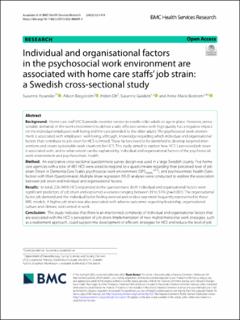| dc.contributor.author | Assander, S. | |
| dc.contributor.author | Bergström, A. | |
| dc.contributor.author | Olt, H. | |
| dc.contributor.author | Guidetti, S. | |
| dc.contributor.author | Boström, A. M. | |
| dc.date.accessioned | 2023-10-05T08:41:20Z | |
| dc.date.available | 2023-10-05T08:41:20Z | |
| dc.date.issued | 2022 | |
| dc.identifier.citation | Assander, S., Bergström, A., Olt, H., Guidetti, S., & Boström, A. M. (2022). Individual and organisational factors in the psychosocial work environment are associated with home care staffs’ job strain: A Swedish cross-sectional study. BMC health services research, 22(1). | en_US |
| dc.identifier.uri | https://hdl.handle.net/11250/3094384 | |
| dc.description.abstract | Background
Home care staff (HCS) provide essential service to enable older adults to age in place. However, unreasonable demands in the work environment to deliver a safe, effective service with high quality has a negative impact on the individual employee’s well-being and the care provided to the older adults. The psychosocial work environment is associated with employees´ well-being, although, knowledge regarding which individual and organisational factors that contribute to job strain for HCS is limited. These factors need to be identified to develop targeted interventions and create sustainable work situations for HCS. This study aimed to explore how HCS´s perceived job strain is associated with, and to what extent can be explained by, individual and organisational factors of the psychosocial work environment and psychosomatic health.
Method
An explorative cross-sectional questionnaire survey design was used in a large Swedish county. Five home care agencies with a total of 481 HCS were asked to respond to a questionnaire regarding their perceived level of job strain (Strain in Dementia Care Scale), psychosocial work environment (QPSNordic34+), and psychosomatic health (Satisfaction with Work Questionnaire). Multiple linear regression (MLR) analyses were conducted to explore the association between job strain and individual and organisational factors.
Results
In total, 226 (46%) HCS responded to the questionnaire. Both individual and organisational factors were significant predictors of job strain and explained a variance ranging between 39 to 51% (p = 0.001). The organisational factor job demand and the individual factor feeling worried and restless was most frequently represented in these MRL models. A higher job strain was also associated with adverse outcomes regarding leadership, organisational culture and climate, and control at work.
Conclusion
This study indicates that there is an intertwined complexity of individual and organisational factors that are associated with the HCS´s perception of job strain. Implementation of new multidimensional work strategies, such as a reablement approach, could support the development of efficient strategies for HCS and reduce the level of job strain. Policy changes for the provision of home care are also needed to support the development of a sustainable and healthy psychosocial work environment. | en_US |
| dc.publisher | BMC health services research | en_US |
| dc.rights | Navngivelse 4.0 Internasjonal | * |
| dc.rights.uri | http://creativecommons.org/licenses/by/4.0/deed.no | * |
| dc.subject | allied health personnel | en_US |
| dc.subject | aging | en_US |
| dc.subject | community health services | en_US |
| dc.subject | delivery of health care | en_US |
| dc.subject | health service research | en_US |
| dc.subject | nursing | en_US |
| dc.subject | organisations | en_US |
| dc.subject | personnel management | en_US |
| dc.subject | reablement | en_US |
| dc.title | Individual and organisational factors in the psychosocial work environment are associated with home care staffs’ job strain: A Swedish cross-sectional study | en_US |
| dc.type | Journal article | en_US |
| dc.source.volume | 22 | en_US |
| dc.source.journal | BMC health services research | en_US |
| dc.source.issue | 1 | en_US |
| dc.identifier.doi | https://doi.org/10.1186/s12913-022-08699-4 | |
| dc.source.articlenumber | 1418 | en_US |

